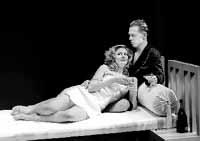| SAINT FRANCES OF
HOLLYWOOD by Sally Clark Toronto Sun By JOHN COULBOURN
It's not a pretty story in the telling, and it's rendered even less so in Clark's stage play, under the direction of Hrant Alianak. Presented as a sort of low-rent homage to Hollywood B-movies, intercut with clips from Farmer's films, St. Frances picks up the young star's life before she's tasted fame. Brash, youthful, brimming with hope and promise, she's rejected God, embraced socialism and set her sights on a stage career with New York's prestigious Group Theatre. But before she can join the Group, she is hijacked by Hollywood and thus begins her torturous descent to hell.
This review provided by Dario |
SAINT FRANCES OF HOLLYWOOD A RAW, SLOPPY WAIL by Laura Kostersky In Moo, the play that made her, Sally Clark wrote about a woman wrongly committed to an insane asylum. She continues this fascination in her new play, about the tragic life of actress Frances Farmer.Farmer was a beautiful, promising actress who wrecked her movie career by boozing, cursing and politicking her way into the nuthouse. Clark melodramatically points the finger most aggressively at Farmer’s mother - a woman who lived vicariously through her daughter’s career. As Farmer blows her chances in Hollywood, her mother has her committed. Much of the play is about Farmer screaming obscenities, getting _ucked by orderlies and sailors, thrown into ice baths, jolted with electricity and finally lobotomized into a childlike state. Clark doesn’t overlay these events with much interpretation. The vaguely provocative notion that Frances is some kind of modern saint, for example, (and that, like all martyrs, she needs to suffer) is just tossed aside. In between scenes, photos and footage from some of Farmer’s old films are projected onto the back wall. Though fascinating, they are not meaningfully integrated into the play. Despite Clark’s inherently moving subject matter, the writing lacks the imaginative flair and satirical precision of Moo. In Saint Frances of Hollywood Clark seems to have lost her wicked sense of humor and in its place offers a raw, sloppy wail of a play that does no more than chronicle psychiatric atrocities. Thea Gill (as Farmer) looks the part, but vocally she blows only one note: husky and loud. Her breathless performance (like the script) lacks contour and subtlety, and her acting borders on ham. from EYE WEEKLY Toronto’s arts newspaper - January 25, 1996
Sally Clark This review and image provided by Dario |
|

